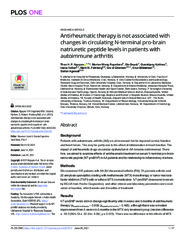Antirheumatic therapy is not associated with changes in circulating N-terminal pro-brain natriuretic peptide levels in patients with autoimmune arthritis
Permanent lenke
https://hdl.handle.net/10037/24052Dato
2021-06-25Type
Journal articleTidsskriftartikkel
Peer reviewed
Forfatter
Nguyen, Thao H.P.; Fagerland, Morten; Deyab, Gia; Hjeltnes, Gunnbjørg; Hollan, Ivana; Feinberg, Mark W.; Eilertsen, Gro Østli; Mikkelsen, Knut; Agewall, StefanSammendrag
Methods: We examined 115 patients with AA (64 rheumatoid arthritis (RA), 31 psoriatic arthritis and 20 ankylosis spondylitis) starting with methotrexate (MTX) monotherapy or tumor necrosis factor inhibitors (TNFi) with or without MTX co-medication. NT-proBNP (measured in serum by ECLIA from Roche Diagnostics), and other clinical and laboratory parameters were evaluated at baseline, after 6 weeks and 6 months of treatment.
Results: NT-proBNP levels did not change significantly after 6 weeks and 6 months of antirheumatic therapy (pbaseline-6weeks = 0.939; pbaseline-6months = 0.485), although there was a modest improvement from 6 weeks to 6 months in the MTX only treatment group (median difference = -18.2 [95% CI = -32.3 to -4.06], p = 0.013). There was no difference in the effects of MTX monotherapy and TNFi regimen on NT-proBNP levels. The changes in NT-proBNP after antirheumatic treatment positively correlated with changes in C-reactive protein (CRP) and erythrocyte sedimentation rate (ESR). Baseline NT-proBNP levels were related to baseline CRP and ESR levels, and some other established markers of disease activities in crude analyses.
Conclusion: Circulating levels of NT-proBNP were related to established inflammatory markers at baseline, and the changes in NT-proBNP after antirheumatic treatment were positively related to these markers. Nevertheless, antirheumatic therapy did not seem to affect NT-proBNP levels compared to baseline, even though inflammatory markers significantly improved.


 English
English norsk
norsk